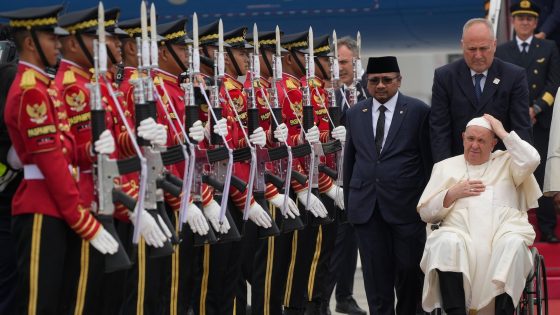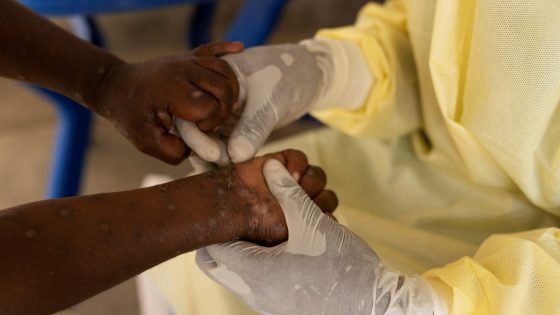JAKARTA, Indonesia — Pope Francis arrived in Indonesia on Tuesday at the start of the longest trip of his pontificate, hoping to encourage its Catholic community and celebrate the tradition of interfaith harmony in a country with the world’s largest Muslim population.
After an overnight flight from Rome, Francis was wheeled off the plane in his wheelchair and onto the tarmac for a welcoming ceremony under Jakarta’s perennial hazy, humid and polluted skies.
Two children wearing traditional clothes handed him a bouquet of vegetables, fruits, spices and flowers.
Francis planned to rest for the remainder of the day, given the rigors of an 11-day voyage zigzagging across time zones that will also take him to Papua New Guinea, East Timor and Singapore. However, the Vatican said the 87-year-old pope would meet later Tuesday with a group of refugees, migrants and sick people at the Vatican residence in Jakarta.
His first full day of activities begins Wednesday with visits to the country’s political leaders and meetings with Indonesian clergy who are helping to fuel the growth of the Catholic Church in Asia.
Indonesian President Joko Widodo welcomed the pope, saying in a broadcast statement that “Indonesia and the Vatican have the same commitment to fostering peace and brotherhood, as well as ensuring the welfare of humanity.”
The highlight of Francis’ first stop will be his participation Thursday in an interfaith meeting in Jakarta’s iconic Istiqlal mosque with representatives of the six religions that are officially recognized in Indonesia: Islam, Buddhism, Confucianism, Hinduism, Catholicism and Protestantism.
The mosque, the largest in Southeast Asia, sits across a piazza from the capital’s main Catholic cathedral, Our Lady of Assumption, and the two are so close to each another that the Muslim call to prayer can be heard during Mass.
Their proximity is not coincidental, but strongly willed as a symbol of religious freedom and tolerance that is enshrined in Indonesia’s Constitution. The buildings are also linked by an underground “Tunnel of Friendship” which Francis will visit with the grand imam, Nasaruddin Umar, before they sign a joint declaration.
While Francis will want to highlight Indonesia’s tradition of religious tolerance, the country’s image as a moderate Muslim nation has been undermined by flare-ups of intolerance. In 2021, a militant Islamic couple blew themselves up outside a packed Catholic cathedral on Indonesia’s Sulawesi island during a Palm Sunday Mass, injuring at least 20 people.
“We have no problem with the visit. He’s a guest and we will welcome him,” said Eldy, a 64-year-old retired government worker who uses one name and was out walking during a car-free day in Jakarta on Sunday. “He wants to visit our Istiqlal mosque, he can do it.”
Even though Catholics make up only 3% of Indonesia’s population, the sheer number of Indonesians — 275 million — makes the archipelago home to the third-largest Christian community in Asia, after the Philippines and China.
As a result, thousands are expected to throng to Francis’ events this week, which include a Mass on Thursday afternoon at Jakarta’s main stadium expected to draw some 60,000 people. City authorities have urged residents to work from home that day given roadblocks and crowds.
“It is a joy for our country, especially for us Catholics,” said Elisabeth Damanik, a 50-year-old housewife outside a packed Mass on Sunday at Our Lady of the Assumption. “Hopefully the pope’s visit can build religious tolerance in our beloved country of Indonesia.”
Care for the environment, conflict resolution and ethically minded economic development are the major themes for the trip, and Francis may touch on them during his main speech to Indonesian authorities on Wednesday.
Francis has made caring for the environment a hallmark of his pontificate and has often used his foreign visits to press his agenda on the need to care for God’s creation, prevent exploitation of its natural resources and protect poor people who are bearing the brunt of climate extremes and pollution.
In Jakarta, he will find a metropolis of 11.3 million people choking under gray clouds of air pollution caused by coal-fired power plants, vehicle exhaust, trash burning and factories. Jakarta’s air pollution regularly registers eight to nine times above World Health Organization limits.
“Indonesia has the worst air pollution in Southeast Asia,” said Piotr Jakubowski, an air pollution expert and co-founder of Indonesian air quality monitoring company Nafas. “The visit of the pope is great because it provides a sounding board … from another, very well-respected world leader.”
Residents, too, hope Francis will speak out about the issue.
“The pollution in Jakarta is at an alarming level. That’s why the presence of the pope can provide a benefit with the discussion of environmental issues,” said government worker Erik Sebastian Naibaho, 26.
Francis is the third pope to visit Indonesia after Pope Paul VI in 1970 and St. John Paul II in 1989. Their attention underscores Indonesia’s importance to the Vatican both in terms of Christian-Muslim dialogue and Catholic vocations, since it is home to the world’s largest seminary and produces hundreds of priests and other religious workers a year.
“Indonesia is trying to grow in the faith,” said Cardinal Ignatius Suharyo Hardjoatmodjo, the archbishop of Jakarta whom Francis made a cardinal in 2019.
At a briefing last week, he said Francis wanted to express his appreciation for Indonesia’s interfaith tradition “and encourage this kind of brotherhood to continue to be maintained and developed.”
___
Tarigan reported from Jakarta, Indonesia. Helena Alves contributed from Jakarta.
___
Associated Press religion coverage receives support through the AP’s collaboration with The Conversation US, with funding from Lilly Endowment Inc. The AP is solely responsible for this content.
Source Agencies



